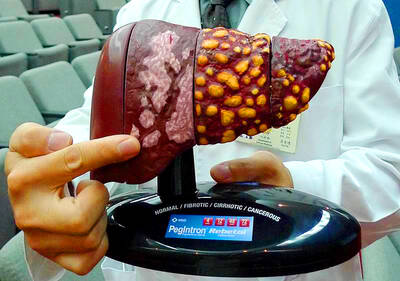The nation can expect another cold weekend this week as a cold air mass is expected to arrive on Friday, the Central Weather Bureau said yesterday.
The front of the mass is expected to start affecting the nation tomorrow night, bringing showers to northern and central regions.
On Friday, the lows in these regions may fall to 13 degrees Celsius. The high in northern and northeastern regions, on the other hand, may reach 18 degrees Celsius or 19 degrees Celsius.
High temperatures in central and southern regions are forecast to drop to 23 degrees Celsius, whereas the high in the east may drop to around 21 degrees Celsius.
On the bright side, the current spell of sunshine should continue through tomorrow, with highs reaching 26 degrees Celsius or 27 degrees Celsius.
Meanwhile, the bureau's seismological center reported an earthquake at 2:09pm yesterday, with a magnitude of 5.6 on the Richter scale.
The bureau said the epicenter of the earthquake was located 19.7km southeast of its observation station in Hualien. The depth was 37.3km.
The quake was caused by energy release in an area where the Eurasian and Philippine tectonic plates press against each other.
The earthquake was felt nationwide. The highest intensity was felt in Yanliao (鹽寮), Hualien County, where it reached 4.0 on the Richter scale.
In Taipei the temblor was a 1.0.
Three earthquakes of magnitude 5.0 or above have struck since the beginning of this month.
The previous two occurred on Jan. 2 and Jan. 5, with epicenters in Hualien and Ilan respectively.

The Taipei Summer Festival is to begin tomorrow at Dadaocheng Wharf (大稻埕), featuring four themed firework shows and five live music performances throughout the month, the Taipei Department of Information and Tourism said today. The festival in the city’s Datong District (大同) is to run until Aug. 30, holding firework displays on Wednesdays and the final Saturday of the event. The first show is scheduled for tomorrow, followed by Aug. 13, 20 and 30. To celebrate the 30th anniversary of Disney Pixar's movie Toy Story, the festival has partnered with Walt Disney Co (Taiwan) to host a special themed area on

BE CAREFUL: The virus rarely causes severe illness or death, but newborns, older people and those with medical conditions are at risk of more severe illness As more than 7,000 cases of chikungunya fever have been reported in China’s Guangdong Province this year, including 2,892 new cases last week, the Centers for Disease Control (CDC) yesterday said it is monitoring the situation and considering raising the travel notice level, which might be announced today. The CDC issued a level 1 travel notice, or “watch,” for Guangdong Province on July 22, citing an outbreak in Foshan, a manufacturing hub in the south of the province, that was reported early last month. Between July 27 and Saturday, the province reported 2,892 new cases of chikungunya, reaching a total of 7,716

STAY VIGILANT: People should reduce the risk of chronic liver inflammation by avoiding excessive alcohol consumption, smoking and eating pickled foods, the physician said A doctor last week urged people to look for five key warning signs of acute liver failure after popular producer-turned-entertainer Shen Yu-lin (沈玉琳) was reportedly admitted to an intensive care unit for fulminant hepatitis. Fulminant hepatitis is the rapid and massive death of liver cells, impairing the organ’s detoxification, metabolic, protein synthesis and bile production functions, which if left untreated has a mortality rate as high as 80 percent, according to the Web site of Advancing Clinical Treatment of Liver Disease, an international organization focused on liver disease prevention and treatment. People with hepatitis B or C are at higher risk of

Aftershocks from a magnitude 6.2 earthquake that struck off Yilan County at 3:45pm yesterday could reach a magnitude of 5 to 5.5, the Central Weather Administration (CWA) said. Seismological Center technical officer Chiu Chun-ta (邱俊達) told a news conference that the epicenter of the temblor was more than 100km from Taiwan. Although predicted to measure between magnitude 5 and 5.5, the aftershocks would reach an intensity of 1 on Taiwan’s 7-tier scale, which gauges the actual effect of an earthquake, he said. The earthquake lasted longer in Taipei because the city is in a basin, he said. The quake’s epicenter was about 128.9km east-southeast